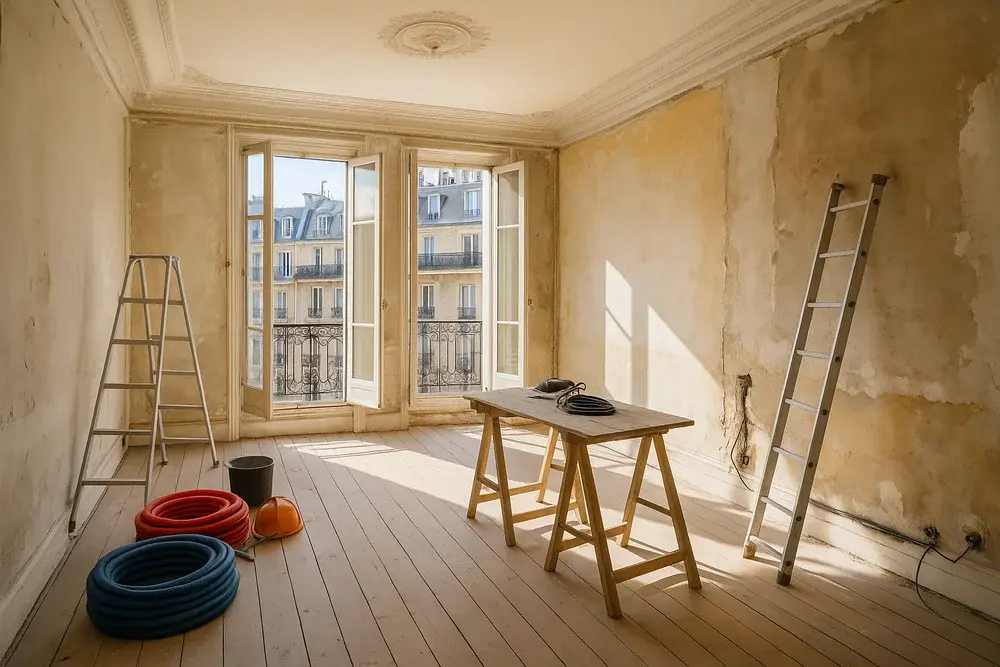How to write a real estate offer
Buying a property in Paris or elsewhere can be a stressful and uncertain process. Drafting the offer to purchase is a crucial moment, when every detail counts. What should be included in the offer? How do you structure it and avoid mistakes? Discover, step by step, how to write an offer that will attract the seller's attention and maximize your chances of success.

Understanding the role of the real estate purchase offer
What is a real estate purchase offer?
The offer to purchase is a document that formalizes your intention to purchase a property at a given price. It marks the first commitment in the buying process. Once accepted by the seller, the offer seals an important step, even if it is not legally binding like the compromis de vente. The offer serves to formalize interest in the property and initiate negotiations.
IMPORTANT: once the compromis de vente has been signed, the private buyer of a residential property has a 10-day right of withdrawal, which allows him or her to withdraw from the transaction without penalty. This right need not be mentioned in the offer to purchase itself. It applies automatically when the preliminary contract (compromis or promesse de vente) is signed. The main aim of the offer to purchase is to open negotiations while securing the transaction, without overloading the document with legal elements that will be discussed later.
On the seller's side, if he accepts a written offer to purchase, he is committed to the sale and has no right of withdrawal.
A well-drafted offer to purchase must include at least the following elements:
- the identity of the buyers
- date of visit,
- description of the property
- the proposed price,
- Financing of the transaction
- conditions precedent (if any),
- period of validity of the offer
Essential information in an offer to purchase

Don't overlook the legal aspects
When you draw up an offer to purchase a property, certain legal elements are essential if your proposal is to be considered serious and valid. First of all, it is imperative that you state your identity as the buyer.
Next, the date of the visit and the description of the property must be mentioned. The description must include the exact address, floor, surface area, number of rooms and any other information specific to the property, such as the presence of a cellar or parking space.
In addition to this information, you may wish to point out that the offer is subject to the suspensive condition of obtaining financing, guaranteeing that the buyer is not obliged to purchase the property if his mortgage is refused. However, this is not compulsory in the offer to purchase, as it must be mentioned in the preliminary sales contract.
It is possible to mention that you waive the loan suspensive condition.
Be careful, however, not to agree to waive the loan suspensive condition if you do not have the capacity to buy the property without taking out a loan. You would be taking on significant and ill-considered financial risks.
Mention of the proposed price is central to your offer to purchase. This is the amount that buyer and seller agree to discuss and potentially conclude.
It's also advisable to include a validity date for the offer, to avoid it being left open indefinitely. This will enable the buyer to withdraw after a certain period if the seller fails to respond.
Financial details to be included in the real estate purchase offer
In addition to the proposed purchase price, an offer to purchase must also clarify the financing terms envisaged by the buyer. The seller will want to be sure that the buyer has the financial means to purchase the property. If the purchase is partly financed by a bank loan, it's a good idea to specify this in the offer, as well as the amount of the personal contribution envisaged.
It's a good idea to include a financing plan with your offer to purchase. This should be requested from your banker or broker.
Mentioning these financial elements reassures the seller about the buyer's ability to finalize the transaction , and avoids misunderstandings about the feasibility of the project.
The validity period of the offer to purchase
This is the period beyond which the offer becomes null and void. Generally speaking, this period is 5 to 10 days, depending on how quickly the seller is expected to respond. This ensures that the buyer doesn't get stuck on a proposal indefinitely, while putting a little pressure on the seller to make a decision quickly.
{{cta-vert-en="/../style-guide"}}
Once accepted by the seller, the buyer is obliged to take the steps leading to the preliminary contract. However, the existence of the buyer's right of withdrawal, mentioned earlier in this article, offers the buyer a way out.
Setting the right price in the real estate offer to purchase

How to estimate the value of a property?
Estimating the value of a property is one of the most delicate elements in drawing up a purchase offer. To propose a fair price, it's essential to take several factors into account: the property's location, its general condition, its surface area, but also local market trends. In cities like Paris, prices vary considerably from one neighborhood to another, and even from one street to another, depending on proximity to shops, transport and schools.
If your valuation is too low, you risk upsetting the seller, while if your offer is too high, you could end up overpaying for the property. It's therefore advisable to use reference sales prices, i.e. similar properties recently sold in the same area. Online tools such as real estate databases or specialized platforms can help you get an idea of current prices. However, only the notaries' BIEN database can provide you with sufficiently detailed data to make an accurate estimate.
Hiring a property hunter may be a good option for refining this estimate. These professionals have information on recent transactions and can better assess the specific features of a property and analyze sales price references to give you a reliable estimate.
Price negotiation strategies
Once you've determined a realistic estimate for your property, it's time to think about your real estate negotiation strategy . In a high-demand market like Paris, it can be difficult to negotiate downwards. However, there are a number of factors that can help you adjust the price downwards.
For example, if the property has defects (work to be carried out, unfavorable energy diagnostics), you can justify an offer below the asking price. In this case, it's important to mention the reasons why you're asking for a lower price.
Similarly, if the property has been on the market for several months, the seller may be more inclined to accept a lower offer.
Common mistakes to avoid when setting a price
Setting an offer price is a delicate step that requires precision and strategy. Here are some common mistakes to avoid:
- Offering too low a price: underestimating the value of the property can give the impression that you're not taking the offer seriously. The seller may reject your proposal immediately, or even stop negotiating altogether.
- Propose a price that's too high: make an offer that's always below the price you want to obtain (while remaining reasonable).
- Not understanding when an apartment will sell without negotiation: sometimes apartments sell without negotiation. Ignoring this point puts you at risk of missing out on a great opportunity.
- Relying solely on online prices: the prices you see on ads don't reflect actual transaction amounts. They are starting prices. Many properties actually sell for less than the advertised price.
- Forgetting to calculate ancillary costs: when you make an offer, don't forget to take into account notary fees (7-8%) and the cost of any work required. These additional costs can affect the value of your purchase and should be factored into your overall budget.
Structuring your offer

Sample offer to purchase letter
Here's a template for structuring your offer to purchase letter:
Subject: Property purchase offer
Identity of buyers
Following the visit on (date of visit) of the apartment (description of the apartment), we propose to purchase the apartment for the price of (in figures and words).
(You may, if it seems reassuring to the seller, indicate your professional situation).
The purchase will be financed by a personal contribution of (amount of personal contribution). We will finance the remainder of the purchase with a mortgage.
This offer is valid until (offer validity date: between 5 and 10 days).
Yours sincerely
This simple, clear structure enables the seller to quickly see the key information in the offer. This makes it easier to make a decision and shows that you are serious about your commitment.
Elements that can be added to a real estate purchase offer
Including your professional situation and the reasons why the apartment appealed to you can reinforce the credibility of your offer and create a bond of trust with the seller. Briefly mentioning your profession and financial stability - without going into too much personal detail - can reassure the seller of your ability to complete the transaction and repay your future mortgage.
{{cta-bordeaux-en="/../style-guide"}}
What's more, sharing what you particularly like about the property, whether it's its proximity to your work, its layout that's perfect for your family, or its cachet, can make all the difference. It humanizes your offer and shows that you're invested in the project. This can work in your favor if the seller is attached to the property or is hesitating between several offers. By also indicating your plans for the property - such as making it your home or investing in its renovation - you personalize your offer, making it more attractive and authentic in the eyes of the seller.
Suspensive conditions in an offer to purchase
What are suspensive conditions?

A suspensive condition is a clause specifying that one or more obligations must be met before the sale can be completed. If the conditions are not fulfilled, the buyer can withdraw without cost or penalty. This is a protection for the buyer, as it secures the purchase under certain conditions.
Suspensive conditions are common and varied, but they must be formulated clearly and precisely to avoid any misunderstanding. They may concern various aspects, including financing, the resale of an apartment, or the granting of certain authorizations.
Financial conditions: loan and downpayment
The most common suspensive condition concerns obtaining a mortgage. If you take out a loan to finance the purchase, you must mention this in your offer to purchase. However, as the suspensive condition of obtaining a mortgage is obligatorily mentioned in the promesse or compromis de vente for the purchase of a home by a private individual, it is not necessary to mention it in the offer to purchase. The notary will draw it up in the preliminary sales contract.
It's a good idea to state the minimum amount of your down payment in the offer to purchase. This transparency will reinforce the credibility of your offer.
Other conditions precedent
Other clauses can be added to ensure that the buyer is not blindly committing himself. For example, a clause requiring the sale of the buyer's apartment, so that they have the necessary funds for the purchase.
Building permit suspensive conditions are common in land sales.
Similarly, if the property needs work requiring the agreement of the co-ownership, you can include a clause making the offer conditional on the co-ownership's acceptance.
TIP: If your offer to purchase includes conditions precedent other than financing, we strongly advise you to contact your notary and draw up your offer to purchase under his or her supervision. This will enable you to draw up an offer to purchase that corresponds perfectly to your situation and wishes.
Consequences of an accepted or refused offer to purchase
What happens if the offer is accepted?

If the seller accepts your offer to purchase, this means he agrees to the proposed price and conditions. As a general rule, both parties will quickly sign a preliminary contract , either a compromis or a promesse de vente. This document formalizes the agreement and details the specific conditions of the transaction.
The signing of this pre-contract is a crucial step: it gives legal value to the commitment of both parties, and initiates the 10-day withdrawal period for the private buyer of a residential property.
And if the offer is refused?
If the seller refuses your offer, you have several options. Firstly, it may be worthwhile understanding the reasons for the refusal. Sometimes, the proposed price is considered too low, or the seller has simply received a more attractive offer. If you're really interested in the property, you can adjust your proposal.
{{cta-vert-en="/../style-guide"}}
Is it possible to retract an offer to purchase?
In principle, once the seller has accepted the offer to purchase, the buyer is committed to continuing the process until the signing of the compromis de vente. However, in the case of a residential property purchase, the buyer has the right to cancel the transaction within 10 days of signing the preliminary contract, at no cost or penalty.
However, this right of withdrawal does not apply to commercial property or to professional buyers, who are bound by their commitment as soon as they send an offer to purchase.
In conclusion, the keys to drafting a convincing and secure offer to purchase a property
The offer to purchase is much more than a simple document: it marks the beginning of a concrete commitment to the property you wish to acquire. By drafting a rigorous offer, paying careful attention to financial details and adapting your proposal to the specificities of the market, you demonstrate your seriousness to the seller and maximize your chances of success. If necessary, a property hunter or notary can help you optimize and secure this important step.




